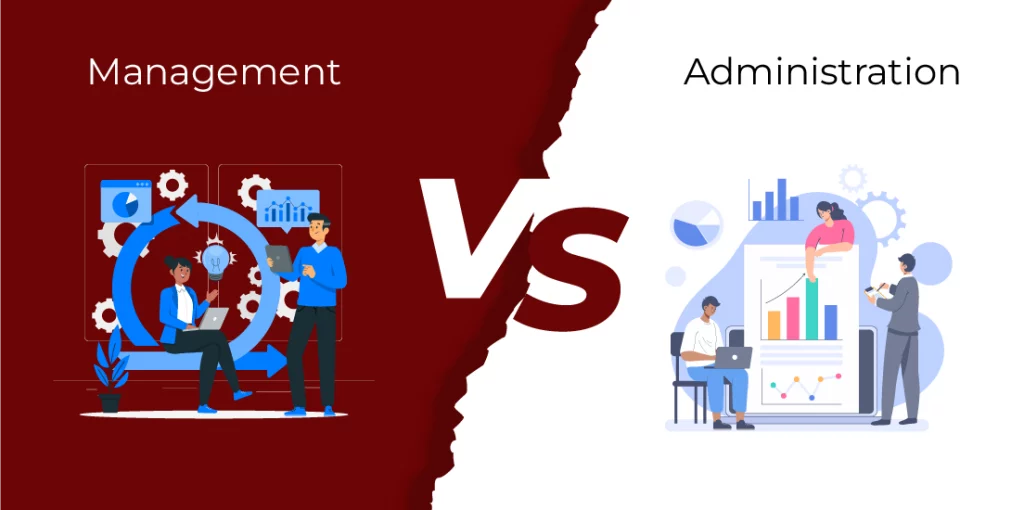
Top Online Full Stack Web Development Course Certification to Advance Your Career
Learn what a full stack development course is, its key features, benefits, career prospects, and more. Master web development skills to boost your career.

If you are working in an office setting, more often than not, you must have across terms like ‘talk to management’ or ‘talk to administration’. The reason behind this could be anything from discussing some ideas to promotion, to complaints, or some other matter. In this whole communication, have you ever thought that management and administration don’t sound like similar phrases? If they are similar, then why do we use them in different scenarios?
Well, they both may give you a feel of the same thing, but there are some profound differences between management and administration. Their scope of work, focus, hierarchy, functions, and decision-making are quite different from each other.
To understand the difference between management and administration better, let’s explore each term in detail.

Enroll Now: Best Management Courses
In the simplest way, management can be defined as a group of people in an organisation setting who are responsible for the execution of plans and policies accurately and turn them into reality.
This includes organising resources, leading teams, and monitoring progress.
Management is also about problem-solving on a daily basis: it could be settling differences among members of the team or adhering to deadlines. At any moment, it is managers who are actually in the middle of all things.
Management is fundamentally answering a very simple question: “How do we accomplish our objectives in the most efficient and effective manner?”
Key Functions of Management
Managers typically handle four key responsibilities:
Planning:
Organising:
Leading:
Controlling:

POSTGRADUATE PROGRAM IN
Multi Cloud Architecture & DevOps
Master cloud architecture, DevOps practices, and automation to build scalable, resilient systems.
The administration refers to the group of individuals in an organisation actively engaged in long-term visioning, policy formulation, and laying down a framework for an overall organisational effort.
If management is to carry out the deeds, then administration is the one which would be stating what should be done.
Administrators usually play a top-level role in the organisation. Making long-term decisions for the organisation is their responsibility. Unlike the actions taken in management, the administration keeps building up a concrete foundation.
Key Responsibilities of Administration
Policy Formulation:
Strategic Planning:
Resource Allocation:
Governance:
As we discussed earlier, management and administration have some fundamental differences. Let’s explore it and compare both in a comprehensive way on different aspects.
| Aspect | Management | Administration |
| Definition | Managing people and resources to achieve specific objectives. | Setting policies, defining strategies, and ensuring organisational governance. |
| Focus | Daily operations, execution, and team coordination. | Long-term planning, policy creation, and strategic direction. |
| Hierarchy | Found at middle and lower levels. | Occupies the top level, such as CEOs or board members. |
| Scope | Broader and more operational, involving direct interactions with employees. | Narrower but strategic, focusing on governance and high-level decisions. |
| Decision-Making | Short- and medium-term decisions on execution and efficiency. | Long-term decisions about organisational goals and policies. |
| Functions | Planning, organising, leading, and controlling. | Policy formulation, resource allocation, and overall supervision. |
| Examples | A branch manager supervising daily bank operations in India. | A district collector overseeing policy implementation in local governance. |
When it comes to real-world scenarios, the difference between management and administration becomes even more evident. While administrators set the vision, managers bring it to life through execution. Both are critical, and one cannot succeed without the other. These roles adapt depending on the industry and organisational structure.
Administration’s Role
Administrators in a corporate office create company-wide policies, such as diversity hiring practices or investment strategies.
Management’s Role
Managers execute these policies by hiring diverse talent or allocating funds to departments.
Administration’s Role
An administrator, like an IAS officer in India, designs welfare schemes or policies for rural development.
Management’s Role
Managers in these departments ensure these schemes are implemented effectively, such as distributing resources or monitoring outcomes.
Administration’s Role
Hospital administrators establish protocols for patient safety or new technology implementation.
Management’s Role
Department managers ensure these protocols are followed, such as supervising surgical procedures or staff schedules.

82.9%
of professionals don't believe their degree can help them get ahead at work.
Now we know the difference between management and administration. They both differ from each other, even on the level of skills and qualities needed to be successful in each role.
| Leadership | Problem-Solving | Time Management | Communication |
| Inspiring and guiding teams to achieve goals. | Addressing challenges effectively and efficiently. | Prioritising tasks to meet deadlines. | Ensuring clear instructions and feedback across teams. |
| Strategic Thinking | Organisational Abilities | Decision-Making | Policy Development |
| Focusing on long-term objectives and planning. | Structuring workflows and ensuring compliance with policies. | Setting the course for organisational success. | Creating frameworks to guide operations and goals. |
Both management and administration bring unique strengths to the table. But like any system, they also come with challenges. Let’s break down their advantages and disadvantages:
Advantages of Management
Disadvantages of Management
Advantages of Administration
Disadvantages of Administration
There are times when the lines between management and administration blur. This overlap happens most often in smaller organisations, where resources are limited and individuals take on multiple responsibilities.
Small Businesses in India
In a local retail business, the owner decides the pricing strategy (administration) and monitors inventory management (management).
Public Sector Projects
A district collector in India may both allocate resources for a development project (administration) and oversee its on-ground implementation (management).
Despite their differences, management and administration share common ground. Both are essential for an organisation’s success.
Key Similarities
Goal-Oriented:
Decision-Making:
Leadership:
Resource Utilisation:
Understanding the difference between management and administration helps clarify how organisations achieve their goals. Management concentration is on daily operations and ensuring that duties are carried through efficiently. Administration, on the other hand, is concerned with dealing with the policies, strategies, and vision that set an organisation’s future.
Both roles are distinct yet interlinked. Administration builds the state on which management works through execution. Depending on the size and structure of the organisation, the two roles sometimes go hand in hand in small setups.
Whether it be managing a team or formal strategic planning, proper balance allows for success in whichever role. Recognition of their unique contributions helps organisations work optimally and creatively towards accomplishing their goal.
For professionals aspiring to excel in these roles, understanding their nuances is critical. This is exactly where a course like the Certificate Program in Strategic Management and Business Essentials by Hero Vired comes into play. It is designed to endow candidates with the knowledge and skill set to manage these professions effectively. The course also prepares you after imparting adequate knowledge concerning strategic planning, decision-making, and leadership.
Updated on February 3, 2025

Learn what a full stack development course is, its key features, benefits, career prospects, and more. Master web development skills to boost your career.

Explore app development course; key benefits, skills gained, and career opportunities in the booming tech industry, and course fees.
![How to Become an App Developer in 2025 [A Detailed Guide]](https://staging.herovired.com/wp-content/uploads/2024/01/app-development-scaled.jpg)
Discover the steps & resources about how to become an app developer. Know the must-have skills and get ready to kickstart your app development career.

It is Easy to Build an App when you have knowledge of Computer Science. Read the Blog All You Need to Know about Computer Science for Application Development

Discover why Flutter is revolutionizing cross-platform app development. Learn its benefits, features, and why it’s the go-to framework for developers worldwide.

Learn what Flutter is, its features, and how it simplifies cross-platform app development. Discover the benefits of Flutter and its popular use cases.

Hybrid apps are essentially web apps that have been put in a native app shell. Read here how hybrid apps are differ from Native and web apps.

Developing applications is a critical job role in today’s world. In this blog, we have listed top 5 things to consider before you design and build an application.